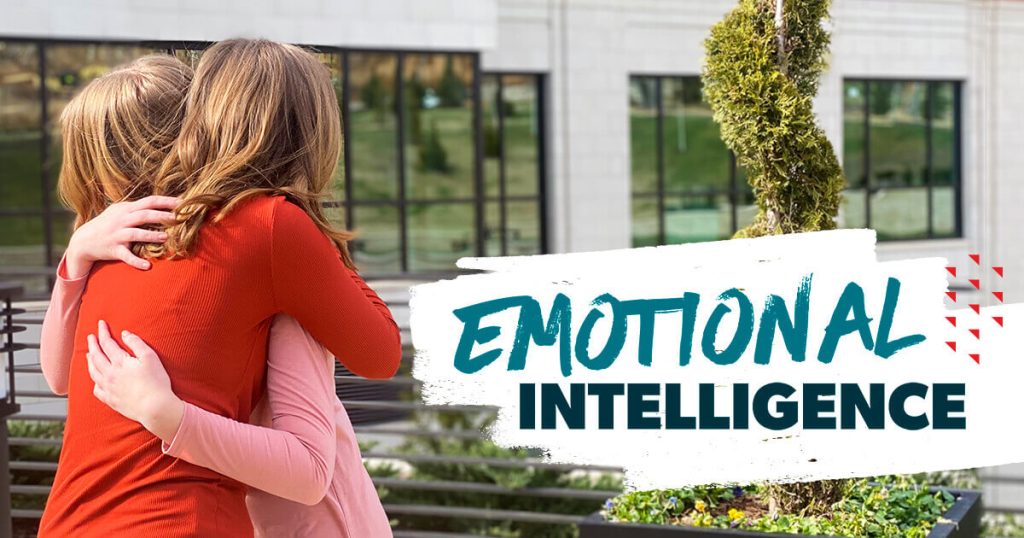Ugh. Feelings.
Everyone—and I mean everyone—has feelings. And we all have different ways of dealing with them. Maybe you, like Drake, enjoy being “in your feelings.” Or maybe you do everything in your power to avoid them. You just keep scrolling or eating or drinking or exercising or working or yelling or buying—anything to cover up your anger or jealousy or loneliness or shame.
Despite our tendency to deny them, emotions and feelings are very real. They are real chemical reactions, thoughts and hormonal responses. The tricky thing is that often, our feelings lie to us.
So, what do you do with all of these feelings and emotions? Soaking in them isn’t a good option. But neither is avoiding them and numbing out. This is where emotional intelligence comes into play.
What Is Emotional Intelligence?
Emotional intelligence (called EI or EQ for short) is the ability to perceive, process, regulate and react to emotions. If you have high EI, you’re comfortable experiencing emotions, and you likely have deep and authentic relationships in your life.
The concept of EI might seem abstract and hard to grasp. But a few decades back, author Daniel Goleman published a book called Emotional Intelligence that takes high-level research and makes these important concepts easier to translate to real life.
EI is most often thought of as a workplace tool, although in recent years it has grown a bit controversial. This article, though, is not about the workplace. It’s about you and how you can utilize emotional intelligence to improve your relationships.
Some of us have high EI in certain areas and low EI in others. Maybe you’re good at reading a room, and you can detect when you’re boring the room with your endless soapbox of specialty diets. But on the other hand, you totally miss the cues when someone is flirting with you.
While some aspects of EI are intuitive for most people, others struggle with it. The good news is that it’s a social skill you can practice. Your brain is capable of amazing things. So, if this whole “feelings” thing doesn’t come naturally, know that if you want to, you can get better at it.
Emotions vs. Feelings: What’s the Difference?
I’m often asked about the difference between feelings and emotions. In a nutshell, emotions are your body’s responses to stimuli, and feelings are your brain’s interpretation of your emotions.
Think of emotions as the unconscious, physiological reactions in your body—the shock you have when your boyfriend breaks up with you, or the excitement you feel when you cross a finish line in first place. Emotions set your body into motion.
Feelings, then, are the way we explain and articulate emotions to ourselves and others. You could interpret your energizing emotions after winning your race as joy. You could interpret your shock from the breakup as anger.
The difference between feelings and emotions is important as we grow in self-awareness, but since most people use them interchangeably (and for the sake of simplicity), I will use the words interchangeably for the rest of the article.
The Importance of Emotional Intelligence
As I said above, whether you want to believe it or not, emotions are part of our human experience. We all have them, and we all need them. And while the signals they provide us are important, they often do not convey actual truth. Emotional intelligence is essential to forming deep, meaningful relationships. A lack of emotional intelligence keeps you stunted and out of touch with yourself and others.
“Emotional intelligence is essential to forming deep, meaningful relationships. A lack of emotional intelligence keeps you stunted and out of touch with yourself and others.”
-Dr. John Delony
We all know people who look successful on the outside, but behind closed doors, their personal life is in shambles. You can hustle and grind and have a high net worth, but if you steamroll people in the process, you’ll be terribly lonely. When it comes to relationships, you can even get what you want—like getting married and having kids—but if you’re emotionally bankrupt, you’ll destroy the very thing you’ve been wanting to create.
Want to build a non-anxious life? Learn how in Dr. John Delony’s new book.
Now, let me be clear about something: Emotions are great for communicating information, but they’re terrible operating instructions. In other words, emotions help us process life and inform our decision making, but we shouldn’t allow them to get in the driver’s seat and call the shots.
People who are low in emotional intelligence are self-centered, condescending, unpredictable and often overly passive or overly assertive. On the other hand, people who are high in emotional intelligence . . .
- Understand their own thoughts and feelings and decisions
- Navigate conflict well
- Create satisfying, deep relationships with their family
- Make (and keep) friends more easily
- Get better at leading and influencing people
- Are humble and open to learning and growth
Components of Emotional Intelligence
According to author Daniel Goleman, there are five main components of EI. Let’s unpack each one.
1. Self-Awareness
Self-awareness is knowing what you’re feeling and why you’re feeling it. When we become more self-aware, we get better at observing our own thoughts and emotions. We can dig deep and examine the stories, values and beliefs we use to interpret the world and respond to people and circumstances the way we do.
The other aspect of self-awareness is the ability to understand how others perceive and interpret your behavior. You might think you come across as confident while others think you’re just being a jerk. Or maybe you consider yourself to be opinionated, while others see you as manipulative.
Self-awareness is essential for EI. It allows you to analyze, label and understand the complex internal world of your feelings. It’s an intentional choice to lean into your unpleasant emotions instead of muscling your way through them.
2. Self-Regulation
Self-awareness (knowing yourself) opens the door to self-regulation (controlling yourself). Hear me say this: You are not a victim to your own thoughts and emotions. Just as a child slowly learns that it’s not acceptable to throw temper tantrums, we grow in self-regulation throughout our lives to learn how to appropriately display our emotions.
On the one hand, you don’t want to ignore or stuff how you are feeling. Find ways to appropriately express your emotions—through distancing yourself from your thoughts, journaling, talking with someone you trust, and openly communicating them to the people in your life.
On the other hand, you don’t want to give full vent to your emotions, living in a constant emotional tug-of-war. Self-regulation is giving yourself the permission to feel fully so you can move forward.
3. Motivation
Motivation is the desire to learn and grow and change—to become the fullest expression of who you were created to be. Motivation happens when you stop sleepwalking through life and take responsibility for who you are today and who you want to become.
Emotionally intelligent people are highly motivated. They see themselves as a work in progress, and they get excited about opportunities to grow and change.
4. Empathy
Empathy is the ability to step into the experiences of other people. It’s connecting with them on a deep level and choosing to take on their perspective and feel what they’re feeling. Empathy is not the same thing as sympathy. Sympathy says, “I care about you,” while empathy says, “I’m hurting with you.”
Empathy is a hallmark of emotional intelligence because it opens the doors for deep connection. It takes a mature, unselfish and unhurried mindset to practice empathy with people in your life.
5. Social Skills
The higher your emotional intelligence, the more easily you’ll create bonds and friendships with people around you. Learning how to make and keep friends, how to forgive, how to listen and ask questions, how to navigate loneliness—it’s all a heck of a lot easier when you have the other four components of EI.
How to Improve Emotional Intelligence
I said earlier that EI is something you can learn and improve. While it’s very nuanced and takes some time, here are a few ways you can work on it:
Learn how to label your feelings.
Most of us aren’t great at accurately describing our own emotions. We default to a few words, like frustrated, fine, tired, anxious, upset. Over time, these words become an identity. They become the lens through which we see and experience the world. But part of growing in EI is learning how to expand your emotional vocabulary and learning how to distance yourself from your thoughts.
Emotions are complex, and they often mask other emotions. You might say you’re upset, when in fact you mean you’re feeling hurt and betrayed. You might say you’re feeling anxious, when in reality you’re lonely.
Remember, emotions are a source of information. Make sure you’re learning the right words to describe and label your feelings so you understand what’s actually going on in your heart and your mind.
Be curious, not judgmental, towards emotions.
As you start to examine your feelings, be curious toward them—not judgmental. Don’t “should” on yourself. Yeah, I’m hurt by what my dad said, but I should just get over it. Or My boss made me so mad in that meeting, so I should give her a piece of my mind.
No. Stop. Pause. Sit in your emotions for a while. Don’t pass judgement on how you should or shouldn’t be feeling. Simply acknowledge what is.
And whatever you do—don’t ignore or stuff down your emotions. This tactic makes you feel better in the moment because it acts like a safety blanket between you and the hard truth. But in the end, avoiding your feelings—especially the unpleasant ones—only makes things worse. They don’t leave. They morph into something destructive.
Work with a therapist.
A good therapist provides a safe space to practice relationships and connection. They act as a mirror for you, reflecting how you come across. They can help you grow in all five areas of EI—from self-awareness to social skills. For most people in most stages of life, finding a therapist and getting professional help is an excellent decision. It doesn’t mean you’re weak. It means you’re wise.
Focus on people over tasks.
We learn emotional intelligence through connection with other people. If you tend to be task-oriented rather than people-oriented, you might need to work harder to put people first. And that’s okay—you bring an incredible set of gifts to the world. You just might have to be more intentional about getting out of “work mode” to practice people skills.
And just because you’re people-oriented doesn’t mean you always truly put relationships first. Instead of thinking of what you can get from others, focus on what you can give. Invest in relationships for the long haul. Show up.
Choose vulnerability.
If you truly want to improve your EI, you need to ask for help and feedback from people you trust. You need to give permission to a few select people you trust to speak into your life and help you grow. This means you’re exposing yourself to the possibility of being hurt. All relationships begin with risk. And yes, growth is painful.
It’s also worth it. You are worth it.
Read, listen and learn.
I can’t possibly cover all the helpful tips for growing in EI in one short article, so I want to leave you with a few helpful resources that will help you grow:
Your Personal Guide to Improving Emotional Intelligence
Learning to navigate the complex territory of our emotional lives is a lifelong process and skill that requires constant growth. If you want to keep growing your emotional intelligence, relationships and mental health, check out The Dr. John Delony Show. You’ll hear me coach live callers as they learn practical ways to improve their emotional health and relationships.
Read the full article here










